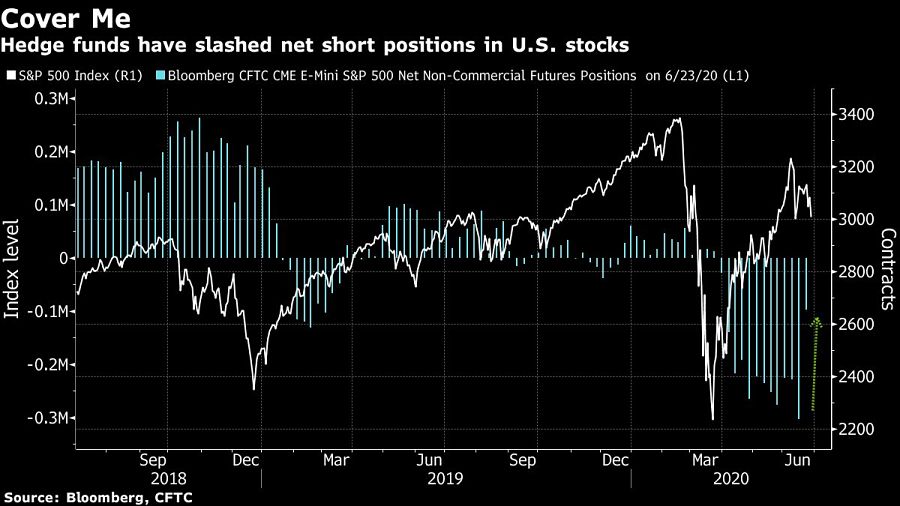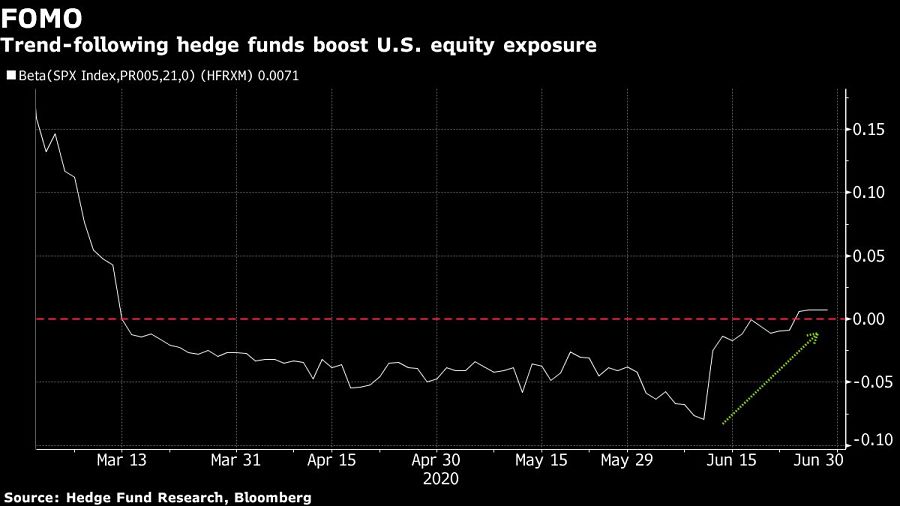

Fast-money hedge funds are rushing to cover their bearish U.S. stock bets even as the equity rally threatens to break down.
Speculative investors bought a net 206,227 S&P 500 Index E-mini contracts in the week ended June 23, the most since 2007, according to the latest Commodity Futures Trading Commission data.
Net short positions in the contracts were at their highest in almost a decade as the U.S. equity rebound pushed the benchmark back toward record territory.

The surge in short-covering comes as traders wrestle with what to do after a pause in one of the most unloved rallies in recent financial history. The S&P 500 had climbed more that 40% from its late-March low to early June, despite concerns that investors were overly optimistic about the pace of the U.S. economic recovery.
U.S. stocks fell almost 3% last week as the coronavirus spread showed no signs of slowing down.
Other measures of trader positioning also point to an increase in short-covering activity.
Short interest as a percentage of shares outstanding in the $266 billion SPDR S&P 500 ETF Trust had fallen to 4.9% Friday from 6.7% at the end of May, according to data from IHS Markit.
Meanwhile, the beta of the Hedge Fund Research Macro/CTA Index -- which tracks funds synonymous with trend-following quant strategies -- to the S&P 500 is back above zero for the first time since March. That suggests CTA funds have been boosting their exposure to U.S. equities and closing short positions.

“The CTA short base in global equities futures now looks tilted toward a ‘cover’ now,” Nomura Securities strategist Charlie McElligott wrote in a note Friday.

While industry statistics pointing to a succession crisis can cause alarm, advisor-owners should be free to consider a middle path between staying solo and catching the surging wave of M&A.

New joint research by T. Rowe Price, MIT, and Stanford University finds more diverse asset allocations among older participants.

With its asset pipeline bursting past $13 billion, Farther is looking to build more momentum with three new managing directors.

A Department of Labor proposal to scrap a regulatory provision under ERISA could create uncertainty for fiduciaries, the trade association argues.

"We continue to feel confident about our ability to capture 90%," LPL CEO Rich Steinmeier told analysts during the firm's 2nd quarter earnings call.
Orion's Tom Wilson on delivering coordinated, high-touch service in a world where returns alone no longer set you apart.
Barely a decade old, registered index-linked annuities have quickly surged in popularity, thanks to their unique blend of protection and growth potential—an appealing option for investors looking to chart a steadier course through today's choppy market waters, says Myles Lambert, Brighthouse Financial.
